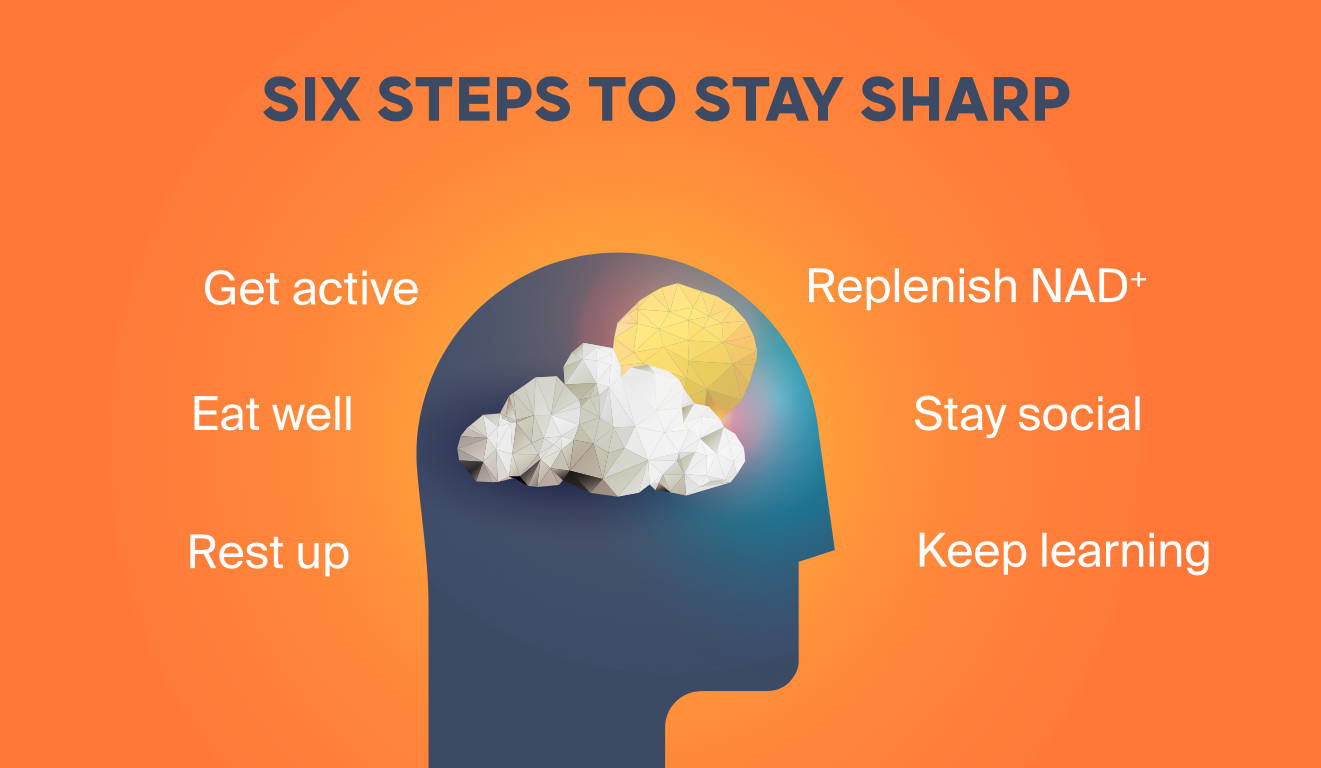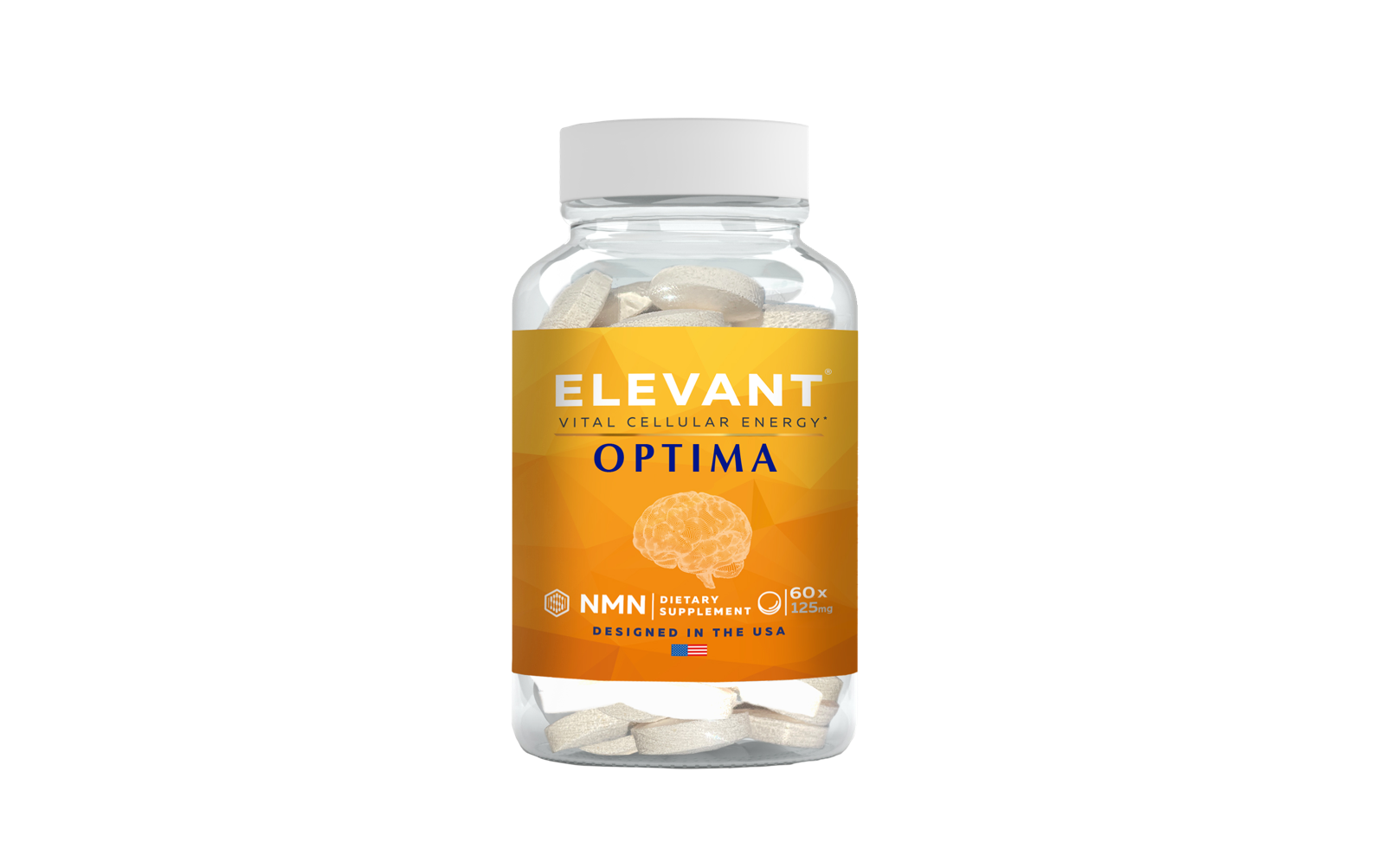Why is cognitive health important (and how can NAD+ help)?
Why is cognitive health important (and how can NAD+ help)?

What is brain health?
The US Centers for Disease Control and Prevention defines brain health as ‘an ability to perform all the mental processes of cognition, including the ability to learn and judge, use language, and remember1. While the American Heart Association/American Stroke Association (AHA/ASA) defines optimal brain health as ‘average performance levels among all people at that age who are free of known brain or other organ system diseases in terms of decline from function levels, or as adequacy to perform all activities that the individual wishes to undertake2.
That’s quite a mouthful. But although the AHA/ASA definition is a little knotty, it highlights an important aspect: that the absence of brain diseases is just as important as having the brain health to do the things you want to do.
A clear, easy-to-understand definition combines elements from both of the explanations above: brain health is the preservation of optimal brain integrity and mental and cognitive function, and the absence of overt neurological disorders3.
Why is cognitive health important?
Cognitive health is important because it determines your ability to clearly think, learn, and remember.
Your brain’s job starts well before you are born. In the womb, it controls your body's functions and makes instinctive decisions that keep you alive. As you learn and experience new things throughout life, your brain evolves. In a healthy brain, new connections continually develop, and broken ones are repaired.
As you get older, particularly from middle age onwards, changes can start to occur within the brain that trigger a gradual decline in mental capabilities. This is known as age-related cognitive decline, and it typically results in people becoming more forgetful and less mentally sharp.
When cognitive function is impaired, it can have a profound impact on your overall health and wellbeing4. So, although brain health is important at every age, it becomes even more critical as you get older.
The burden of cognitive decline
Cognitive decline can range from mild impairment to dementia; a form of decline in abilities severe enough to interfere with daily life (which most commonly appears in the form of Alzheimer’s disease).
The emotional, physical, and economic toll that poor brain health and cognitive decline takes is huge. And, as life expectancy increases and the population ages, the toll on people and societies is only increasing.
In Europe alone, Alzheimer’s disease and other forms of dementia affect around 10 million people. By 2030, this number is expected to increase to 14 million5, and the societal and economic cost is estimated to increase to over €250 billion – equivalent to the entire GDP of Finland6.
In the United States, Alzheimer's disease and other dementias are among the most expensive diseases to treat, with direct care expenses greater than those for cancer and equal to heart disease7.
Clearly, maintaining a healthy brain and moderating the effects of cognitive decline is desirable not just for you and your family members, but also for society at large.
How can NAD+ support brain health?
NAD+ (nicotinamide adenine dinucleotide: a naturally-occurring molecule essential to life) mediates multiple major processes within your body, including energy metabolism, cellular function and repair, and aging in various tissues including – vitally, in a cognitive health context – the brain8.
NAD+ has been shown to play important roles in metabolic processes in your grey matter. It has positive effects on brain functioning such as transmitting messages between cells, learning, and memory9 – all vital aspects of robust cognitive health.
Unfortunately, the older we get, the more NAD+ is needed to help repair and power our cells, which explains why NAD+ levels decline rapidly with age. In fact, by the time we are middle aged, levels of NAD+ have fallen to half of youthful levels10.
This drop in NAD+ has been linked with the hallmarks of aging and may underlie a wide range of age-related diseases, including conditions that affect neurons in the brain11. Preclinical evidence shows a clear and significant (40%) decrease in NAD+ levels in the hippocampus (the part of your brain responsible for learning and memory) between youthful and aged subjects12.
Countering declines in NAD+ as you age can strengthen your body’s ability to protect itself and helps support a wealth of biological processes13, including cognitive health14.
One way to replenish NAD+ is via NMN, or nicotinamide mononucleotide. NMN is a naturally occurring molecule that is the final step in the biological pathway your body uses to make NAD+. Supplementing with NMN increases the amount of NMN available for your body to create more NAD+, countering falling levels as you age and supporting the foundations of your cognitive health.
Five easy ways to support cognitive health
Lifestyle has a profound impact on your brain health. What you eat and drink, how well you sleep, the amount of exercise you do, your social connections, and the way you manage stress all play a role. Here are some ways you can start taking care of your brain now to maintain cognitive function well into older age.
Get active
Regular exercise isn’t just good for your muscles. It can also strengthen the network of blood vessels that supply the part of your brain responsible for thought, learning and mood. Exercise also helps you control your weight and protects against diabetes and lower blood pressure, so it can protect your brain in several different ways.
Eat well
You know that a balanced diet can nourish your body, but it works just as well for your mind. Eating fresh, natural produce with lower levels of sugar and avoiding processed food and saturated fat can prevent a decline in brain health. Food rich in antioxidants can help defend against the harmful effects of oxidation in your brain, which damages brain cells.
Rest up
Sleep is your body’s opportunity to rest and repair the damage inflicted by daily life. It energizes you, improves your mood and helps strengthen your immune system. It may also reduce buildup in the brain of an abnormal protein called beta-amyloid plaque, which is associated with Alzheimer’s disease. Most adults need somewhere between seven and nine hours of sleep a night to operate at their cognitive peak.
Connect with people
This important aspect of self-care was often taken for granted until Covid-19 imposed unprecedented levels of social isolation on all of us. People with strong social connections tend to have lower blood pressure, a decreased risk of dementia, and a longer life expectancy. Studies have shown that those with high social interaction in their community often experience a slower rate of memory decline. Staying connected with family and friends isn’t just enjoyable – it’s good for your health.
Spark your brain
Use it or lose it, as the saying goes. Keeping your brain fit and healthy with mental exercise is just as important to your general health as a body workout. Mental exercises may improve your brain’s functioning and promote new brain cell growth, decreasing your likelihood of developing dementia. Sudoku, crosswords, learning an instrument or having a healthy debate with a friend – anything that gets your brain whirring can support your cognitive health.
Nurturing better brain health for life
Brain health enables thought, planned action and emotional connections that impact the daily lives and progress of people, families and communities. Maintaining good cognitive health for as long as possible is beneficial for not just your overall health and wellbeing, but that of your family members and society at large.
Many people think of cognitive decline as something that only affects the elderly, but it can begin developing in younger age groups too. Although some people maintain excellent cognitive function well into older age, it's important to start taking care of your brain as early as possible.
Boosting NAD+ levels can strengthen your body’s ability to protect itself and help support important processes, including cognitive health. Pursing lifestyle choices that benefit your brain is also an easy way to defend against age-related cognitive decline. Although everyone’s biology and behavior are unique, maintaining a healthy brain at every stage should be a universal goal in pursuing lifelong wellbeing and healthy aging.
Give your brain a boost with Optima NMN-C®
Optima chewable NMN-C® tablets deliver the extra NMN your body needs to replenish NAD+, which has been shown to support brain health and cognitive function.
• Maintain mental energy
• Support daylong focus
• Promote balanced mood and quality sleep
• Optimize body and mind health
Vegan, gluten and major allergen free, non-GMO, with no synthetic fillers, Elevant Optima was created by leading health and longevity scientists to help you sharpen your best tool by optimizing your body’s natural NAD+ pathways.
References
- Centers for Disease Control and Prevention. Healthy aging. What is a healthy brain? New research explores perceptions of cognitive health among diverse older adults. https://www.cdc.gov/aging/pdf/perceptions_of_cog_hlth_factsheet.pdf
- Gorelick PB, Furie KL, Iadecola C, et al, American Heart Association/American Stroke Association. Defining optimal brain health in adults: a presidential advisory from the American Heart Association/American Stroke Association. Stroke 2017;48:e284-303.
- Wang Y, Pan Y, Li H. What is brain health and why is it important? BMJ 2020. doi:10.1136/bmj.m3683
- Behavioral Risk Factor Surveillance System, Centers of Disease Control and Prevention 2015-2016.
- Alzheimer Europe, Dementia in Europe, Yearbook 2019. https://www.alzheimer-europe.org/Publications/Dementia-in-Europe-Yearbooks
- Alzheimer Europe, Cost of illness and burden of dementia in Europe – Prognosis to 2030. www.alzheimer-europe.org/Research/EuropeanCollaboration-on-Dementia/Cost-of-dementia/Prognosis-to-2030; EurActiv, Rising dementia numbers in EU causes alarm. www.euractiv.com/section/health-consumers/news/rising-dementia-in-the-eu-causes-alarm/
- American Heart Association/American Stroke Association, Brain Health Resources, 2019. https://www.heart.org/en/health-topics/brain-health/brain-health-resources/faqs-about-brain-health
- Gong B, Pan Y, Vempati P, Zhao W, Knable L, Ho L, Wang J, Sastre M, Ono K, Sauve AA, Pasinetti GM. Nicotinamide riboside restores cognition through an upregulation of proliferator-activated receptor-γ coactivator 1α regulated β-secretase 1 degradation and mitochondrial gene expression in Alzheimer's mouse models. Neurobiol Aging. 2013 Jun;34(6):1581-8. doi: 10.1016/j.neurobiolaging. 2012.12.005. Epub 2013 Jan 9. PMID: 23312803; PMCID: PMC3632303.
- Qin W, Yang T, Ho L, Zhao Z, Wang J, Chen L, Zhao W, Thiyagarajan M, MacGrogan D, Rodgers JT, Puigserver P, Sadoshima J, Deng H, Pedrini S, Gandy S, Sauve AA, Pasinetti GM. Neuronal SIRT1 activation as a novel mechanism underlying the prevention of Alzheimer disease amyloid neuropathology by calorie restriction. J Biol Chem. 2006 Aug 4;281(31):21745-21754. doi: 10.1074/jbc.M602909200. Epub 2006 Jun 2. PMID: 16751189.
- Schultz MB, Sinclair D. Why NAD+ Declines during Aging: It’s Destroyed. Cell Metab. 2016 Jun 14; 23(6): 965–966. PMCID: PMC5088772. NIHMSID: NIHMS824727. PMID: 27304496. doi: 10.1016/j.cmet.2016.05.022
- Yahyah Aman, Yumin Qiu, Jun Tao, Evandro F. Fang. Therapeutic potential of boosting NAD+ in aging and age-related diseases. Translational Medicine of Aging, 2 (2018), pp. 30-37 https://doi.org/10.1016/j.tma.2018.08.003
- Stein LR, Imai S. Specific ablation of Nampt in adult neural stem cells recapitulates their functional defects during aging. EMBO J. 2014 Jun 17;33(12):1321-40. doi: 10.1002/embj.201386917. Epub 2014 May 8. PMID: 24811750; PMCID: PMC4194122.
- Rajman L., Chwalek, K., Sinclair, D. 2018. Therapeutic potential of NAD-boosting molecules: the in vivo evidence. Cell Metab. 2018 Mar 6; 27(3): 529–547. https://dx.doi.org/10.1016%2Fj.cmet.2018.02.011
- Johnson S, Wozniak DF, Imai S. CA1 Nampt knockdown recapitulates hippocampal cognitive phenotypes in old mice which nicotinamide mononucleotide improves. NPJ Aging Mech Dis. 2018 Nov 8;4:10. doi: 10.1038/s41514-018-0029-z. PMID: 30416740; PMCID: PMC6224504


